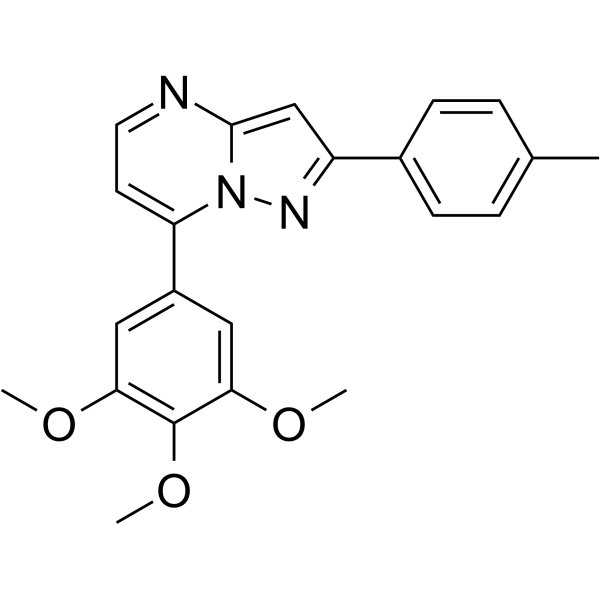| In Vitro |
Tubulin inhibitor 24 (compound 1b) () shows high antiproliferative activity with IC50s of 0.021, 0.047, 0.003, 0.048 µM for Hela, MCF-7, A549, HCT-116, B16-F10 cells, respectively[1]. Tubulin inhibitor 24 inhibites tubulin polymerization with an IC50 value of 2.1 µM[1]. Tubulin inhibitor 24 (5, 10 nM) induces cell cycle arrest at the G2/M phase in a concentration-dependent manner[1]. Tubulin inhibitor 24 (10, 20, 40 nM; 24 h) inhibits MCF-7 cancer cells migration in a dose-dependent manner[1]. Tubulin inhibitor 24 (40 nM; 6 h) destabilizes microtubule by inhibiting tubulin polymerization and disturbing microtubule networks in B16-F10 cells[1]. Cell Proliferation Assay[1] Cell Line: Hela, MCF-7, A549, HCT-116, B16-F10 cells Concentration: 0.00098, 0.0039, 0.016, 0.0625, 0.25, 1.0, 4.0, 16, 64 µM Incubation Time: 48 h Result: Showed high antiproliferative activity with IC50s of 0.021, 0.047, 0.003, 0.048 µM for Hela, MCF-7, A549, HCT-116, B16-F10 cells, respectively. Cell Cycle Analysis[1] Cell Line: MCF-7 cells Concentration: 5, 10 nM Incubation Time: 48 h Result: Cells were arrested at the G2/M phase in a concentration-dependent manner.
|
| In Vivo |
Tubulin inhibitor 24 (10, 20 mg/kg; i.p.; per day for 16 days) shows antitumor activity with no obvious toxicity[1]. Animal Model: 4-6 weeks, male C57/BL mice (B16e-10 tumor model)[1] Dosage: 10, 20 mg/kg (formulated in 5% DMSO, 40% PEG-300 and 55% saline) Administration: I.p.; per day, 16 days Result: Showed antitumor activity with no obvious toxicity.
|
